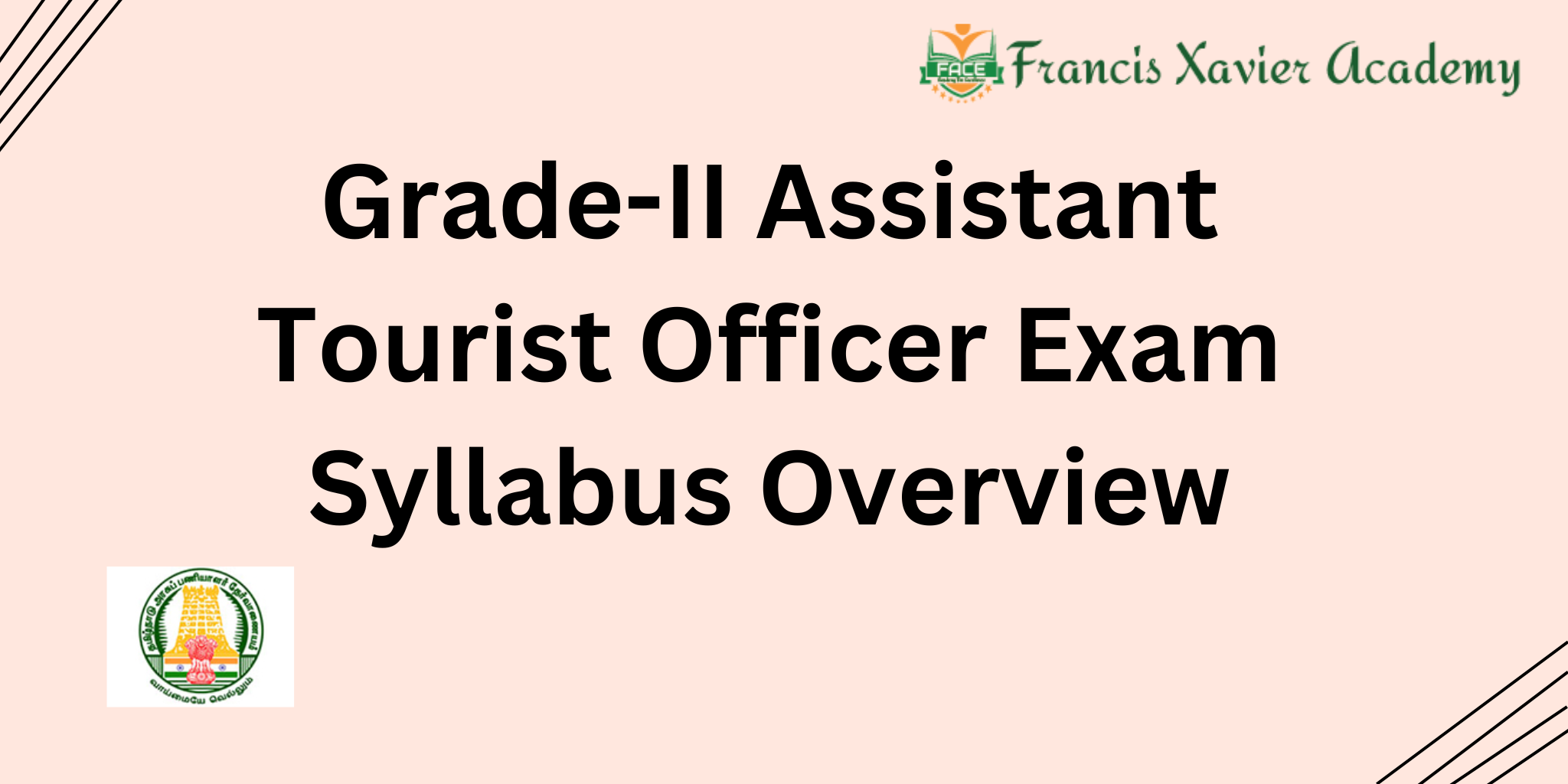
Are you passionate about tourism and eager to contribute to the travel industry in Tamil Nadu? The Assistant Tourist Officer (Grade-II) Main Examination is your gateway to an exciting career in the field of tourism. This exam evaluates candidates on their knowledge of travel, tourism management, policies, marketing, geography, and hospitality. Let’s dive into the detailed Assistant Tourist Officer Exam Syllabus and explore how you can prepare effectively.
PAPER – I: TRAVEL AND TOURISM (OBJECTIVE TYPE)
UNIT 1: Principles and Practices of Tourism
Tourism is not just about travel; it’s an industry that drives economic growth and cultural exchange. This unit covers:
- Definition & Scope: Understanding tourism as a global phenomenon.
- Types of Tourism: Leisure, business, medical, adventure, and eco-tourism.
- Emerging Trends: Sustainable tourism, digital tourism, and experiential travel.
- Tourism in India: Evolution of tourism policies and initiatives.
- Government Bodies: Role of the Ministry of Tourism (Government of India) and the Department of Tourism (Government of Tamil Nadu).
UNIT 2: Tourism Products of India
India is a land of diverse cultures, landscapes, and heritage sites. This unit focuses on:
- Tourist Attractions: Hills, beaches, mountains, rivers, and lakes.
- Cultural Heritage: Forts, palaces, temples, churches, mosques, fairs, and festivals.
- Performing Arts: Folk dances, music, and crafts.
- UNESCO World Heritage Sites: A must-know for every aspirant!
- Wildlife and Adventure Tourism: National parks, sanctuaries, trekking, river rafting, and more.
- Legal Framework: Ancient Monuments Preservation Act (1904) & Ancient Monuments and Archaeological Sites and Remains Act (1958).
UNIT 3: Transport and Connectivity
Tourism thrives on a well-connected transport system. This unit discusses:
- History of Transport: Evolution of land, water, and air travel.
- Airlines in India: Functions, policies, and air charters.
- Indian Road Network: Major highways, expressways, and tourist routes.
- Railway Tourism: Luxury trains like Palace on Wheels, Deccan Odyssey, and more.
- Water Transport: Cruise tourism, ferries, houseboats, and hovercrafts.
UNIT 4: Accommodation and Hospitality
The backbone of tourism is the hospitality industry. Topics include:
- Types of Hotels: Classified by size, location, and service.
- Supplementary Accommodation: Resorts, hostels, homestays, and guesthouses.
- Hotel Operations: Housekeeping, front office management, and food services.
- Booking Systems: Online reservations, travel agencies, and tour operators.
UNIT 5: Tourism Marketing
Marketing strategies shape the success of a tourist destination. This unit covers:
- Tourism Marketing Features & Market Segmentation.
- Consumer Behavior: Understanding tourist preferences.
- Marketing Mix & Promotions: Digital marketing, branding, and tourism campaigns.
- Popular Campaigns:
- Incredible India! (India’s global tourism promotion)
- Enchanting Tamil Nadu: Experience Yourself
- Swachh Bharat Abhiyan: Cleanliness and hygiene in tourism.
- Destination Life Cycle: Growth, saturation, and rejuvenation phases.
UNIT 6: Tourism Policy and Planning
Tourism policies guide the industry’s development. Key topics include:
- Committees & Policies:
- John Sargeant Committee & L.K. Jha Committee (1963).
- National Tourism Policy (1982) & Yunus Committee (1988).
- Tourism Finance Corporation of India (TFCI).
- National Action Plan on Tourism (1992) & National Tourism Policy (2002).
- Tourism in Five-Year Plans and Tamil Nadu’s Tourism Policies.
UNIT 7: Travel Agency & Tour Operations
A well-organized travel agency enhances a tourist’s experience. This unit covers:
- Tour Packages & Itinerary Planning.
- Tour Costing & Budgeting.
- Travel Formalities: Passport, visa, health regulations, travel insurance.
- Customs & Foreign Exchange Rules.
- Baggage Rules & Restrictions.
UNIT 8: Tourism Geography
A travel professional must understand geographical factors affecting tourism. Topics include:
- Physical Geography of India: Climate, rivers, mountains, and plains.
- Political Geography: States, union territories, and key locations.
- Time Zones: Understanding Greenwich Mean Time (GMT) and Indian Standard Time (IST).
UNIT 9: Tourism Organizations
Tourism is supported by national and international organizations. This unit focuses on:
- WTO (World Tourism Organization)
- ICAO (International Civil Aviation Organization)
- IATA (International Air Transport Association)
- PATA (Pacific Asia Travel Association)
- TAAI (Travel Agents Association of India)
- FHRAI (Federation of Hotel & Restaurant Associations of India)
- NTO (National Tourism Organizations)
UNIT 10: Impact of Tourism
Tourism has both positive and negative impacts. Key aspects include:
- Socio-Cultural Impact: Cultural exchange, preservation, and threats.
- Economic Impact: Employment generation, foreign exchange earnings, and economic growth.
- Environmental Impact: Sustainable tourism and conservation challenges.
- Earth Summits & Global Sustainable Initiatives.
Final Thoughts: Preparing for the Assistant Tourist Officer Exam
This Assistant Tourist Officer Exam Syllabus covers a vast range of topics essential for travel enthusiasts and aspiring tourism officers. To ace this exam:
- Stay updated with government tourism policies and campaigns.
- Explore real-world tourism trends by visiting websites like Incredible India & Tamil Nadu Tourism.
- Practice MCQs based on transport, geography, and tourism marketing.
- Revise tourism acts and policies for legal and regulatory aspects.
A career in tourism opens doors to adventure, culture, and global exposure. If you dream of promoting India’s heritage and ensuring seamless travel experiences, this is the perfect opportunity for you!
Start your preparation today, and embark on a journey toward an exciting career in tourism!
General studies syllabus for Assistant Tourist Officer (Grade-II)
 Now
Now